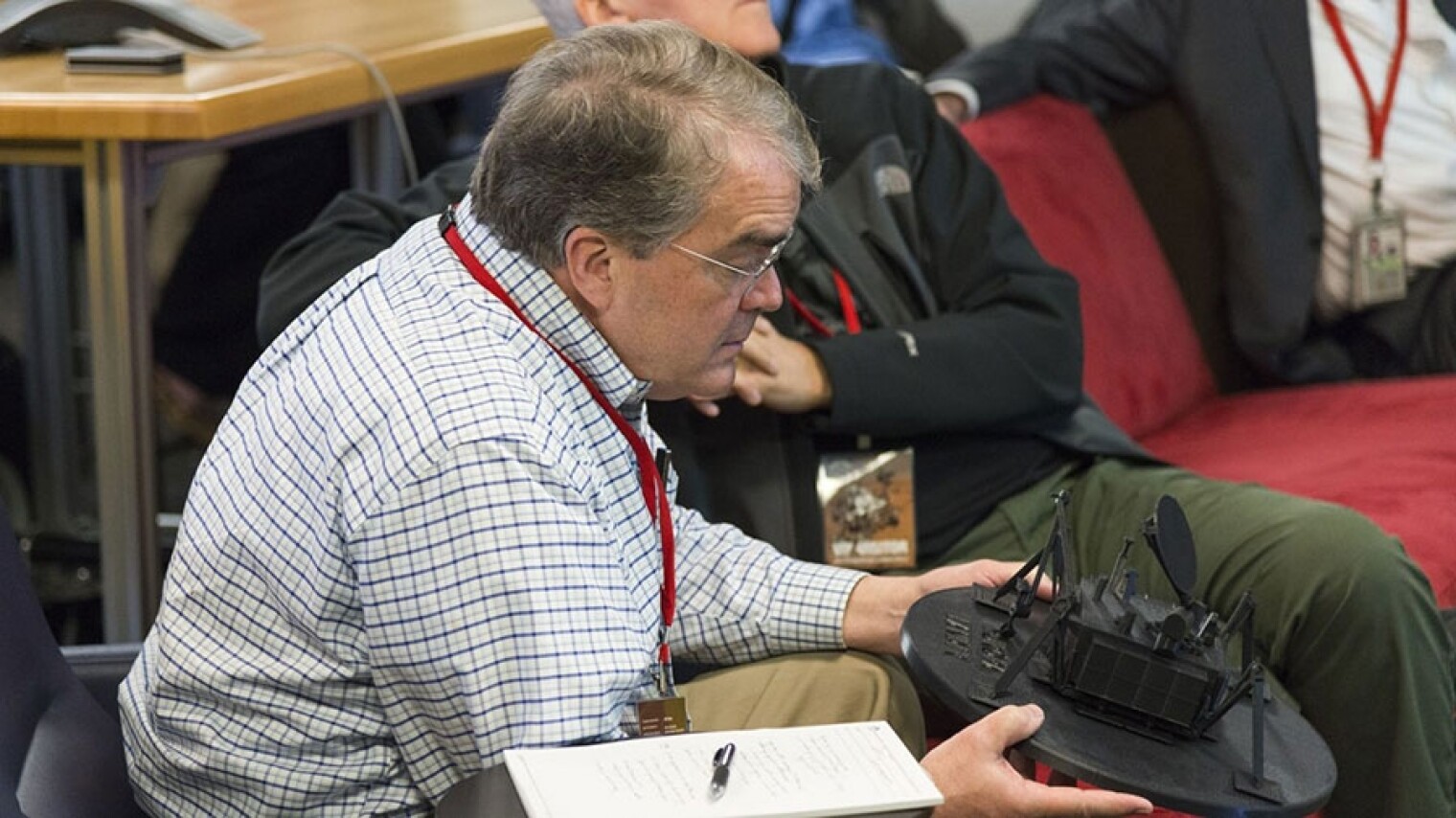| |
What’s Ahead
 |
| (Image Credit – State Department / D. Thompson) |
Congress Returns for Lame Duck Session
This week marks the start of the “lame duck” session of Congress, which runs until the 116th Congress is seated on Jan. 3. Finalizing fiscal year 2019 appropriations will be high on the agenda as the current stopgap spending measure funding many government agencies expires Dec. 7. Lawmakers were reportedly near agreement on several spending bills before they departed for the campaign season, but the bill that funds NASA, the National Science Foundation, and the Commerce Department had not yet entered formal conference negotiations. While Congress could push to wrap up appropriations quickly, disputes over controversial issues such as border wall funding might further delay the process or even threaten a partial government shutdown.
DOE Nuclear Energy Nominee to Face Senate Committee
Rita Baranwal, President Trump’s nominee to lead the Department of Energy’s Office of Nuclear Energy, will appear before the Senate Energy and Natural Resources Committee on Thursday. She is currently director of the Gateway for Accelerated Innovation in Nuclear (GAIN) initiative at Idaho National Laboratory. Pending her approval by the committee, she will join Chris Fall, the nominee to lead the DOE Office of Science, and Lane Genatowski, the nominee to lead the Advanced Research Projects Agency–Energy, among appointees awaiting confirmation by the full Senate. Also appearing at Thursday’s hearing will be Trump’s nominees for National Park Service director and a seat on the Federal Energy Regulatory Commission.
NSF Detailing Mid-Scale Infrastructure and INCLUDES Efforts
The National Science Foundation’s strategies for bolstering support for mid-scale research infrastructure and STEM diversity projects will be a main focus of the Mathematical and Physical Sciences (MPS) Advisory Committee meeting this week at the agency’s headquarters in Alexandria, Virginia. On Thursday, the committee will discuss NSF’s plans to issue new agency-wide funding opportunities for infrastructure projects costing between about $6 million and $70 million. NSF identified significant demand for such projects through a recent survey, with researchers supported by the MPS and Geosciences Directorates together accounting for 80 percent of “high impact” submissions in the $20 million to $70 million range. Chris Smith, a senior advisor for facilities within MPS, will discuss how the directorate is implementing the program. On Friday, the committee will receive an update on the INCLUDES program, NSF’s flagship initiative to address the persistent underrepresentation of women and minorities in STEM fields. NSF recently issued several major awards through the program. The event will be webcast.
National Space Council Advisory Group to Touch on Science
The National Space Council Users’ Advisory Group (UAG) is holding its second meeting on Thursday at NASA’s headquarters in Washington, D.C. After an opening presentation by NASA Administrator Jim Bridenstine, the UAG’s six subcommittees will report on their activities. None are dedicated to scientific matters, though the UAG charter does direct it to provide input on “robotic exploration priorities” and “strategies to increase innovation.” The group will also hear a presentation on “Prioritizing Space Science” by the vice chair of the National Academies Space Studies Board, followed by a talk on “National Security Space: Organization, Technology, and Policy” by Under Secretary of Defense for Research and Engineering Mike Griffin. The meeting will be webcast. To provide the council with additional input from the scientific community, the American Astronomical Society (an AIP Member Society) has organized a listening session that will be attended by several UAG members at its upcoming January meeting.
European Light Source Coalition Holding Inaugural Plenary
The League of European Accelerator-based Photon Sources (LEAPS) is holding its inaugural plenary meeting Monday through Wednesday at the Deutsches Elektronen-Synchrotron (DESY) research center in Germany. Formally established one year ago, LEAPS is a coalition of all the synchrotron radiation and free electron laser user facilities in Europe. In March, it released a strategy document outlining its goals, which include developing research infrastructure and technology roadmaps to guide the planning of future facility projects and R&D efforts. While the premier European light sources are currently setting the global pace for experimental capabilities, LEAPS Chair Helmut Dosch told the U.S. Basic Energy Sciences Advisory Committee in July there remains a pressing need to coordinate national and multinational activities across the continent.
|
|
In Case You Missed It
 |
| With the departure of Rep. John Culberson (R-TX), momentum behind a mission he championed to send a lander to Jupiter’s moon Europa could falter. (Image credit - NASA / JPL-Caltech) |
Election Shakes Up Key Science Committees in House
With the midterm election now passed, attention is turning to who will take on committee leadership positions when the next Congress convenes in January. House Science Committee Ranking Member Eddie Bernice Johnson (D-TX) has already declared she will seek to chair the committee and it is unlikely she will be challenged. Committee Vice Chair Frank Lucas (R-OK) and Energy Subcommittee Chair Randy Weber (R-TX) have released statements declaring their interest in succeeding departing Chair Lamar Smith (R-TX) as the committee’s top Republican. It is unclear which Republican member will fill the gap left by the defeat of Rep. John Culberson (R-TX), the chair of the House Commerce-Justice-Science Appropriations Subcommittee, who is an enthusiastic proponent of space exploration and science. Rep. José Serrano (D-NY), the subcommittee’s top Democrat, has not yet declared whether he will seek to be its chair.
There will be less committee turnover in the Senate, although a few new faces could be in science leadership positions. Commerce, Science, and Transportation Committee Chair John Thune (R-SD) is in line for a leadership position in the Senate Republican Conference, and Ranking Member Bill Nelson (D-FL) currently trails Florida Governor Rick Scott in a race that has triggered a recount. No chairs or ranking members of other important science committees are departing the Senate, although they may make bids to lead different ones.
House Democrats Plan to Focus on Climate Change
House Democrats have declared they will use their majority status to shine a spotlight on climate science and policy. Rep. Nancy Pelosi (D-CA), who will likely be the next speaker of the House, says she will propose recreating a special committee focused on climate change to raise public awareness and “prepare the way with evidence” for mitigation legislation. House Democrats previously operated a Select Committee on Energy Independence and Global Warming from 2007 until 2011, when they lost control of the chamber. Frontrunners to lead several regular committees have also indicated they plan to scrutinize the Trump administration’s stance on climate. Meanwhile, the outlook for bipartisan action on climate change in the House has dimmed. Nearly half of the Climate Solutions Caucus’ 45 Republican members are departing due to retirements and election losses, including its co-founder, Rep. Carlos Curbelo (R-FL). It is unclear how the caucus will react to the loss of so many Republican members, as to date it has only accepted new members in bipartisan pairs.
Trump Appoints New Members to National Science Board
On Nov. 5, President Trump announced his intent to appoint five new members to the National Science Board: neurobiologist Maureen Condic, mechanical engineer Suresh Garimella, Auburn University President Steven Leath, planetary scientist Alan Stern, and biotechnology executive Stephen Willard. He also announced he would reappoint University of Oregon chemistry professor Geraldine Richmond and MIT geophysicist Maria Zuber, who stepped down as board chair in May. NSB is the governing board of the National Science Foundation and comprises 24 members who serve staggered six-year terms. In a statement welcoming the appointees, NSB noted it anticipates an appointment will be made to a remaining vacancy on the board “in the coming months.”
Brian Anderson Named National Energy Technology Laboratory Director
The Department of Energy announced on Nov. 9 the selection of Brian Anderson as director of the National Energy Technology Laboratory (NETL). A professor of chemical engineering, Anderson has been the director of West Virginia University’s Energy Institute since its creation in 2014. NETL focuses primarily on fossil energy R&D and has sites in Pittsburgh; Morgantown, West Virginia; and Albany, Oregon. It is the sole DOE national laboratory that the department operates directly. As director, Anderson replaces Grace Bochenek, who retired in February. Sean Plasynski, executive director of NETL’s Technology Development and Integration Center, has been serving as acting director and will now become the lab’s deputy director.
European Weather Satellite Joins Polar Constellation
The European Organization for the Exploitation of Meteorological Satellites (EUMETSAT) added a third weather satellite to its polar-orbiting constellation with the Nov. 6 launch of Metop-C. The satellite is part a joint effort with the National Oceanic and Atmospheric Administration to collect data for mid-to-long-range weather forecasting. NOAA provided four of the thirteen instruments onboard the spacecraft, including two microwave radiometers that will measure atmospheric temperature and humidity. The first two Metop satellites, launched in 2006 and 2012, have outlived their initial five-year lifespan, permitting them to continue collecting data in concert with the latest Metop spacecraft and NOAA’s polar orbiting satellite constellation.
|
|
Events This Week
League of European Accelerator-based Photon Sources: 2018 Plenary Meeting (continues through Wednesday)
Deutsches Elektronen-Synchrotron (Hamburg, Germany)
Invitation only
|
|
Opportunities New AAAS Science Policy Center Staffing Up
NASA Seeking Senior Science Advisor for Exploration
NASA’s Science Mission Directorate is hiring a senior science advisor for its deputy associate administrator for exploration. Candidates must have experience managing planetary science exploration programs, with Lunar and Mars science experience strongly preferred. Applications are due Nov. 30.
NSF Seeking Senior STEM Education Advisor
The National Science Foundation is hiring a senior advisor for STEM education to oversee program evaluation efforts in its Education and Human Resources Directorate. Candidates must have a doctorate in a field related to STEM and at least six years of relevant research or managerial experience. Applications are due Nov. 30.
Know of an upcoming science policy opportunity? Email us at fyi@aip.org.Know of an upcoming science policy event? Email us at fyi@aip.org.
|
|
Around the Web
News and views currently in circulation. Links do not imply endorsement.
Congress
Science, Society, and the Economy
Education and Workforce
Research Management
Labs and Facilities
Energy
Quantum Science and Technology
Space
Weather, Climate, and Environment
Defense
Biomedical
International Affairs
- Europe’s researchers benefit from reduced bureaucracy (Nature)
- Why a European agency post can be an excellent destination for researchers (Nature)
- Statement on the importance of fundamental research for the UK (Royal Astronomical Society)
- Why the Bank of England should put a female scientist on its next £50 note (Nature, editorial)
- Scientists angry at UK visa denials for African, Asian researchers (Reuters)
- UKRI China launch continues Walport’s global push (*Research)
- Picking flowers, making honey: The Chinese military’s collaboration with foreign universities (Australian Strategic Policy Institute, report by Alex Joske)
- Western universities urged to rethink Chinese military ties (Times Higher Education)
- Barring Chinese from research projects ‘should not be taboo’ (Times Higher Education)
- The benefits of collaborating with Chinese universities (Times Higher Education, perspective by David Sweeney and Vivienne Stern)
- US adopts new battle plan to fight China’s theft of trade secrets (Wall Street Journal)
- Tencent, Chinese scientists initiate award program to prompt sci-tech development (Xinhua)
- Portugal to build satellite launch pad, lab with China (Reuters)
- Neutrino physics for Korean diplomacy (Science, perspective by Rachel Carr, et al.)
- Russian physics journal celebrates a century of progress (Physics World, interview with Valery Rubakov)
- Canada’s innovation superclusters ready to launch (Science|Business)
- Marrying science and politics: The Canadian conference where politicos and researchers swap ideas (Globe and Mail)
|
|
|
| |
| |
|
